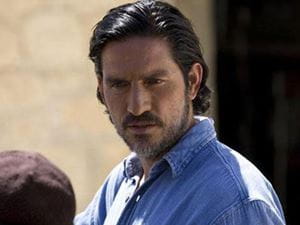
Jim Caviezel has had memorable roles in movies like "Pay it Forward," "High Crimes," and "Frequency," but he is perhaps best known for his portrayal of Jesus Christ in Mel Gibson's "The Passion of the Christ."
In Caviezel's new film, "The Stoning of Soraya M."—based on the novel of the same name by French writer Freidoune Sahebjam—he plays a journalist who learns about a small Muslim community's dark secret. Academy Award-nominated actress Shorhreh Agdashloo plays Zahara, the woman who tells the heart-breaking story of her niece Soraya.
A conservative Catholic, Caviezel spoke to Beliefnet's Entertainment Editor Dena Ross about why we need to be more like the Good Samaritan and his hopes for making people's lives better through his work.
As a Christian, what was it like immersing yourself in Muslim culture for your role in the new movie? Did you learn anything new about the religion or the culture that you hadn't known before?
Oh, it was interesting. There was a man when I first got there, he was a Sunni Muslim. He drove me around. He [brought] my luggage to my [hotel] room, and he says, "I cannot believe I'm driving the man who played Jesus!" So, right away, I thought we were in a good spot there.
But he had a very peaceful countenance to him. We had a situation where we had to go across the border, and the guards were giving us a hard time. And he had a great, calm countenance to himself, and got out of the car and basically let them have it. I was in real good hands there.
Did you know much about stoning before you took on the role?
I knew that, yes, stoning existed, but [not] to the degree [that it does]. It's very hard to accept that stoning still exists in the world today. I was floored to realize that this story was relatively recent. However, I was also caught by the universality of the story.
How so?
While the stoning is an extreme example, power in the wrong hands can be very dangerous, whether it is another part of the world or down the street.
In the film, the power is based in religion. It is particularly frightening to me to recognize that people can misuse religion in such extreme and frightening ways. I was also drawn to the courage of many of the characters, particularly the two ladies, and, of course, the journalist that I was asked to play, [who was] in a community where no one spoke up or stopped to question out of fear. It was intriguing to work on a character who was an outsider and who was willing to risk his life. The character I played, Freidoune, was tried in absentia and sentenced to death for perceived anti-Iranian writings from this book. He was in hiding for a number of years. About 48 hours before I was going to meet him, he died. I would think that probably bringing the whole story back was as much disturbing to him to have to live this whole thing over again.
Do you think that the new movie is going to affect people of faith the same way Passion of the Christ did?
Well, in the "Passion of the Christ," even though we don't go into this particular story, but in one of Jesus' sermons he talks about the Good Samaritan, where you have a man who was beaten up on the side of the road. Two people come by, one being a regular [man] and the other who was a priest, and they [each] did nothing. They sat there and watched the guy and went past [him thinking] "None of my business."
And so, the man that comes and helps him is his enemy, supposedly, the Good Samaritan. Picks him up, puts him on his camel, and takes him to the hotel and provides for him, and then tells the innkeeper, "Hey, I'll be back in a while, and I'll give you more than you basically need."
And he said, and Jesus is telling us, "That's what you need to do as Christians." So much of the time we try to convert through either judging or saying they're Muslim or they're another religion. Is it possible that, if we lived our faith, that people would want to be like us? And so much of the time they are repelled by it because of the lack of love, the lack of calm, the lack of peace, and really no strength.
It's really until the last 30, 40 years where Christians have become amalgamated to the world--not being able to accept the cross, not being able to accept suffering. And that's part of the secular environment here, where we live every day in this place of "You deserve more. You deserve this." We don't deserve anything. [It's] just by grace that we're here and that we have to live our lives for Heaven, and to understand that, whether it is this story or the Christ one. The Christ [story] kind of hits [Christians] over the head because they can identify that, but [the question is] can they find the Christ in this [story]?
The point I'm trying to make is that you go to church on Sunday. But the real Christ is out there in your life every day, whether it be the guy you help on the street, how you live your life, and your countenance that makes people want to be you. And that comes with suffering, and part of that suffering is what draws others into it. It shines a light upon them [and] it's a part of the persecution that [Jesus] underwent as well.
Do you think that it's difficult to be a Christian in Hollywood right now?
I think that in these times of course it is. But again, I'm not sitting here complaining about it. Anything that I undergo, I look at as redemptive suffering. In other words, the pain that I go through [is] for the conversion of sinners. And I ask God that he could use my suffering for that. So, if I stop and complain about it too much, it's not going to help the cause in any way. It's not going to bring any peace. It's not going to move my faith forward and in the direction that He wants me to be.
Do you think that you're extra-vulnerable, as someone who's publicly proclaimed his faith, to rumors or gossip by the media?
I get a chance to be a part of projects that entertain and also that help me grow, not just as an actor, but also as a person. I also hope that I am occasionally involved in projects that touch other people in ways that make their lives a little better, more interesting for the moment that makes them think. I would tell you that one of the greatest challenges of being in the film business in Hollywood is accepting that I have a specific job in the business and that many of the other aspects of a project in which I may be involved that are completely outside my control.
I may be fortunate and fall into a role through the strangest circumstances or, in other cases, may not get to be part of something that I have a particular passion [for] because of all sorts of reasons beyond my control. On finished projects, I will oftentimes see a wonderful film with a great cast and script and that may never find an audience like this one.
When the project is one of your own and you've invested a lot of your heart in it, it can be crushing if you focus too much on what should have happened rather than accepting what you could be proud of that may have been more within your responsibility and control. Those are not easy things to accept on a day-to-day basis.
Do you have a favorite Bible verse that inspires you?
Philippians 4:13. "I can do all things through Christ who strengthens me."
How does that help you as an actor?
Look at my work. Look at what I came into [in] the business. I wasn't surrounded by Christians in this business, I was surrounded by actors. It's no different than when I played basketball. I don't think Michael Jordan cares whether or not you're a Christian. He cares whether or not you can play and help him win games. That's the bottom line. In this business, I earn my respect on how I perform. That's it.
Is there anything else about the new movie you want to talk about?
Some [people] have walked out on the movie. I said, "Understand that it might be hard to watch this, but understand that that lady and many of those women that have gone through this, suffered a little bit more than we did." It's good to bring attention to things that are highly immoral. In this case, I think it's more immoral not to do anything about it.
Weren't there similar responses to "Passion of the Christ"—where people couldn't bring themselves to finish watching it?
I think that people understand what the story is. It's about whether they see it or not. This one, they'll hear about it, and it's the same thing. We're all playing the story out of the Bible right now. Many of us are different characters. We always try to think of ourselves as the saints and the good characters, but many of us are playing the Pharisees, Pontius Pilate, Judas. There are good and there are bad in this world. But our job is not to figure that out. We just know who we are and try to take as many people we can to Heaven by how we live our life.
And I think stories like this, moral reminders, they're powerful. If we cower in the movie, we'll probably cower in life. If we cower in the movie, then we say, "I'm not ready. I've got to get ready." Something might come up where people are going to run from or walk away from, and I know I'm not there yet.
It's a humility thing. And eventually, that's when greatness happens [and] you're able to do courageous things. Movies like this help you see where you're at. Yes, it's very difficult to watch, but also, have you ever watched a move at times and you feel like you'd run? Well, you probably will in real life, too.
And so, playing it out is kind of a trial run--a practice for the real thing that might come to your doorstep one day. We all are going to have to make that, and it'll be different ways. It'll be different things. It'll be a trial like that and different ways to prove our love for God. Eventually, that will happen. I can promise you this much: It will take everything out of you, and it will demand nothing less than courage from God. If you won't have it within you--if you don't have it within you—we won't be able to do it when it really counts.

